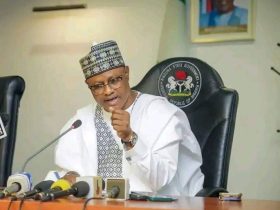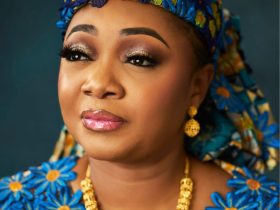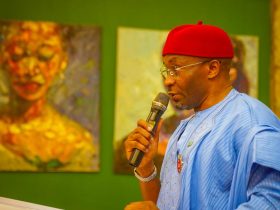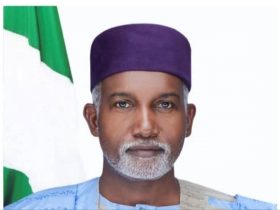The Speaker of the House of Representatives Rt. Hon. Abbas Tajudeen, Ph.D, has said Nigeria is committed to achieving the Sustainable Development Goals (SDGs), stating that the resolve is unshaken.
Speaker Abbas stated this at the ongoing P20 Summit in New Delhi, India, while speaking on ‘Accelerated Sustainable Development Goals (SDGs) in Nigeria.’
The Speaker stated that Nigeria’s dedication to the SDGs extends beyond mere rhetoric.
He recalled that in 2015, Nigeria embarked on a comprehensive transition strategy from the Millennium Development Goals (MDGs) to the SDGs, which sought to build on the gains made from 2016 to 2020, scaling up implementation between 2021 and 2025 and accelerating progress between 2026 and 2030.
The Speaker also recalled that Nigeria established the Office of the Senior Special Assistant to the President on SDGs (OSSAP-SDGs) in January 2016.
“The Office has contributed immensely to institutionalising the SDGs in Nigeria by implementing strategic initiatives and programmes,” he said.
According to him, Nigeria has conducted independent country-led evaluations of SDG-3 (quality health and well-being for all) and SDG-4 (inclusive education and lifelong learning for all).
He further recalled that Nigeria also sponsored United Nations Resolution A/77/L.64, which focused on enhancing voluntary national reviews through country-led evaluations.
He said the resolution was backed by multiple countries, including Russia, China, Jamaica, Senegal, and South Africa, underscoring Nigeria’s international influence, and commitment to robust mechanisms for monitoring SDGs progress worldwide.
Other notable efforts by Nigeria, Speaker Abbas noted, include playing a central role in the global launch of the Integrated National Financing Framework (INFF).
“This sustainable financing plan solidifies Nigeria’s dedication to achieving the SDGs,” he said, adding that the country had also developed an Integrated Sustainable Development Goals (iSDGs) Simulation Model, a locally tailored analytical framework and a policy simulation tool for the SDGs at the national and sub-national levels.
This innovation, he said, facilitates the alignment of the national development strategies with the SDGs, enabling the government agencies to allocate resources towards SDG realisation efficiently.
Special Adviser to the speaker on Media and Publicity Musa Abdullahi Krishi in a statement said that the Speaker also stated that Nigeria, has actively engaged in Voluntary National Reviews (VNRs) to demonstrate transparency and commitment, presenting evidence-based reports at the United Nations High-Level Political Forum (UNHLPF) in 2017 and 2020.
Speaker Abbas said these reports spotlight the policy frameworks and regulatory mechanisms carefully crafted to embed the SDGs within the national policies, plans, and programs.
Importantly, he noted, state governments across Nigeria have set up analogous SDG offices, typically nested within their Ministries of Budget and Economic Planning.
He said: “Nigeria’s journey towards the realisation of the SDGs has been significantly affected by the COVID-19 pandemic, which strained healthcare systems, diverted resources from other health priorities, and disrupted routine healthcare services, leading to setbacks in achieving goals related to maternal and child health, infectious diseases, and access to healthcare.
“The economic fallout from the pandemic, including job losses and income inequalities, has pushed many people into poverty and food insecurity, making it challenging to achieve these SDGs. It also negatively impacted education, gender equality and climate action, among others.
“However, our resolve to achieve the SDGs remains unshaken. Our approach emphasises inclusivity, ensuring that no Nigerian is left behind. Expanding upon legislative interventions, it is imperative to highlight the establishment of SDG committees in the National Assembly to advance the integration of the SDGs into our legislative processes and actions.
“In recognition of the pivotal role of the OSSAP-SDG, we have consistently increased budgetary allocations to empower and enable effective coordination and oversight of SDG-related initiatives.
Additionally, constituency projects by lawmakers necessarily incorporate SDG-aligned initiatives and projects.”
While noting that one of the key roles of parliament is law-making, the Speaker noted that Nigeria recently passed the Out-of-School Children Commission Act 2023, aimed at addressing educational disparities, promoting access to quality education for all and preserving cultural and religious practices.
In addition, Speaker Abbas noted that the 10th House had created committees for people with disabilities, women’s affairs, and youth development in the House of Representatives to demonstrate Nigeria’s commitment to vulnerable and marginalised groups.
“To foster bi-partisanship and cross-party collaboration, we have ensured that the Committees on SDGs, Women Affairs, Youth Development and more are led and deputised by members across party lines,” he said.
Speaker Abbas also noted that the National Assembly enacted the Climate Change Act, the first Parliament in Africa to take such a measure, towards mitigating the negative effects of climate change.
He said: “Also, to facilitate the implementation of the SDGs, the Nigerian Government created the National Climate Council, which regulates climate change issues in the country.
“All these measures, therefore, show that Nigeria remains steadfast in its commitment to the SDGs, with a strong emphasis on inclusivity and equitable development.
Through comprehensive measures and ongoing collaboration, we aim to achieve these vital global goals and create a more sustainable and prosperous future for all Nigerians by 2030 and beyond.” He said.











Leave a Reply